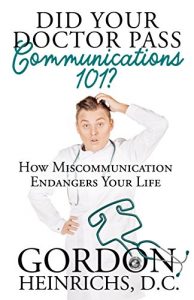Did Your Doctor Pass Communications 101?, reveals why your doctor’s ability to communicate information to you—talk to you so you understand—is at least as important as his/her skills at diagnosis, medical instrumentation, or knowledge of the newest medical discovery. A “good doctor” communicates with the skills disclosed in this book. And it’s not just the words used. Effective communication includes many qualities: body language, respect for the patient, effective listening, and offering patients clear written communication to name a few.
Did Your Doctor… informs you what good and bad doctor-patient communication looks and sounds like. It also offers simple, non-intimidating, strategies you can use to immediately improve your communication with your doctor and improve his/her communication skills for all patients in the office. And yes, these strategies are applicable to you, even if you’re shy or reserved.
You’ve seen other books that inform you about what questions to ask when you visit your doctor or how to be an assertive patient. Those are fine when you have the “perfect” doctor. But there are times when you just don’t understand and you’re not that “assertive” person and you don’t have time to review all your questions. This book will help you identify when communication is faulty—leading to your misunderstanding—and an effective way of gaining understanding when it happens; without being aggressive.
You may be one of those patients who has walked out of your doctor’s office failing to understand what to do next, or failing to understanding what was said during the office visit because you didn’t recognize miscommunication when it occurred and didn’t ask for clarification. And even if you did recognize it, you probably thought it was your fault for not understanding. It wasn’t. It’s your doctor’s responsibility to make sure you understand.
There are simple techniques he/she can use to verify your understanding. The questions, “Did you understand? or “Do you have any questions?” are two of the most common methods doctors use to verify your understanding; and they are two questions that should almost never be used during an office visit. You’ll understand why they’re actually a hindrance to understanding after reading this book. Those questions make communication worse; not better. But here’s the good part. When your doctor asks those questions, there are words you can immediately use to bring the conversation back to where it needs to be—so that you can understand.
Understanding of medical information from your doctor is truly priceless because it can save your life and prevent accidental injury. Miscommunication of medical information is one of the most common causes of death in the U. S. Did Your Doctor… will help you so you don’t become a medical statistic of things gone drastically wrong.
Did Your Doctor… informs you what good and bad doctor-patient communication looks and sounds like. It also offers simple, non-intimidating, strategies you can use to immediately improve your communication with your doctor and improve his/her communication skills for all patients in the office. And yes, these strategies are applicable to you, even if you’re shy or reserved.
You’ve seen other books that inform you about what questions to ask when you visit your doctor or how to be an assertive patient. Those are fine when you have the “perfect” doctor. But there are times when you just don’t understand and you’re not that “assertive” person and you don’t have time to review all your questions. This book will help you identify when communication is faulty—leading to your misunderstanding—and an effective way of gaining understanding when it happens; without being aggressive.
You may be one of those patients who has walked out of your doctor’s office failing to understand what to do next, or failing to understanding what was said during the office visit because you didn’t recognize miscommunication when it occurred and didn’t ask for clarification. And even if you did recognize it, you probably thought it was your fault for not understanding. It wasn’t. It’s your doctor’s responsibility to make sure you understand.
There are simple techniques he/she can use to verify your understanding. The questions, “Did you understand? or “Do you have any questions?” are two of the most common methods doctors use to verify your understanding; and they are two questions that should almost never be used during an office visit. You’ll understand why they’re actually a hindrance to understanding after reading this book. Those questions make communication worse; not better. But here’s the good part. When your doctor asks those questions, there are words you can immediately use to bring the conversation back to where it needs to be—so that you can understand.
Understanding of medical information from your doctor is truly priceless because it can save your life and prevent accidental injury. Miscommunication of medical information is one of the most common causes of death in the U. S. Did Your Doctor… will help you so you don’t become a medical statistic of things gone drastically wrong.












